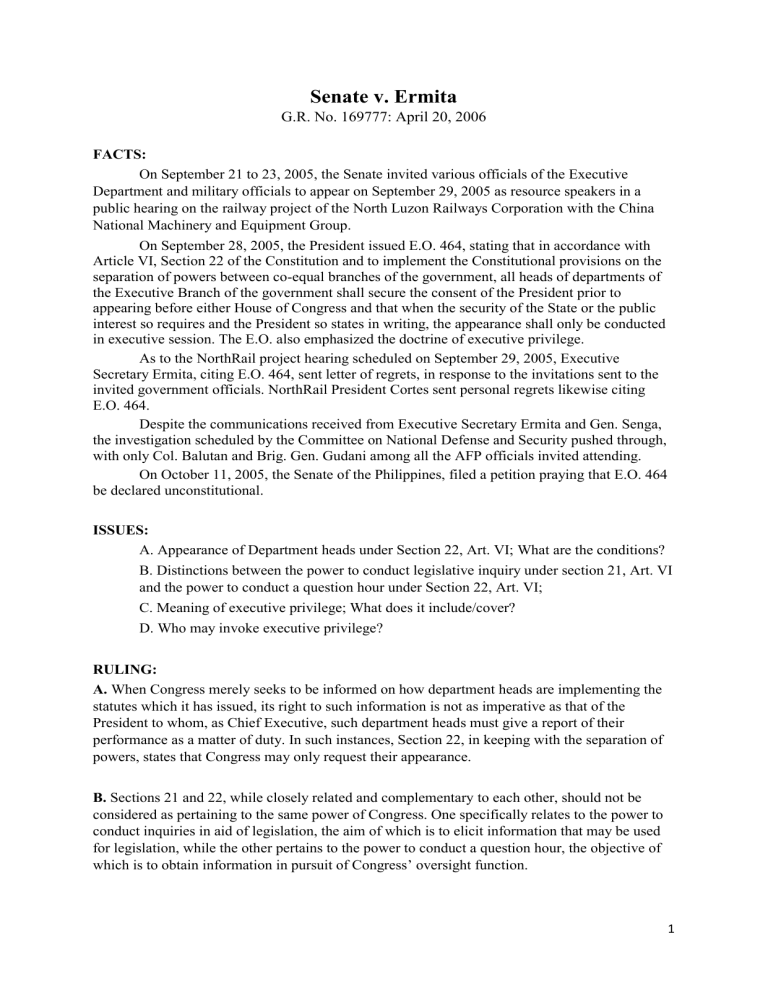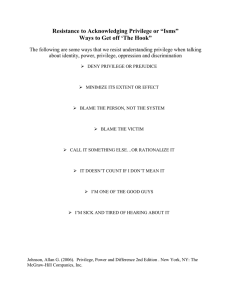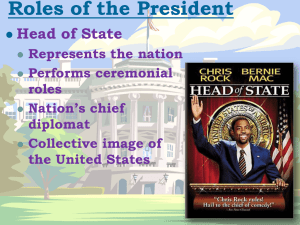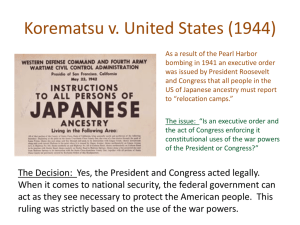
Senate v. Ermita G.R. No. 169777: April 20, 2006 FACTS: On September 21 to 23, 2005, the Senate invited various officials of the Executive Department and military officials to appear on September 29, 2005 as resource speakers in a public hearing on the railway project of the North Luzon Railways Corporation with the China National Machinery and Equipment Group. On September 28, 2005, the President issued E.O. 464, stating that in accordance with Article VI, Section 22 of the Constitution and to implement the Constitutional provisions on the separation of powers between co-equal branches of the government, all heads of departments of the Executive Branch of the government shall secure the consent of the President prior to appearing before either House of Congress and that when the security of the State or the public interest so requires and the President so states in writing, the appearance shall only be conducted in executive session. The E.O. also emphasized the doctrine of executive privilege. As to the NorthRail project hearing scheduled on September 29, 2005, Executive Secretary Ermita, citing E.O. 464, sent letter of regrets, in response to the invitations sent to the invited government officials. NorthRail President Cortes sent personal regrets likewise citing E.O. 464. Despite the communications received from Executive Secretary Ermita and Gen. Senga, the investigation scheduled by the Committee on National Defense and Security pushed through, with only Col. Balutan and Brig. Gen. Gudani among all the AFP officials invited attending. On October 11, 2005, the Senate of the Philippines, filed a petition praying that E.O. 464 be declared unconstitutional. ISSUES: A. Appearance of Department heads under Section 22, Art. VI; What are the conditions? B. Distinctions between the power to conduct legislative inquiry under section 21, Art. VI and the power to conduct a question hour under Section 22, Art. VI; C. Meaning of executive privilege; What does it include/cover? D. Who may invoke executive privilege? RULING: A. When Congress merely seeks to be informed on how department heads are implementing the statutes which it has issued, its right to such information is not as imperative as that of the President to whom, as Chief Executive, such department heads must give a report of their performance as a matter of duty. In such instances, Section 22, in keeping with the separation of powers, states that Congress may only request their appearance. B. Sections 21 and 22, while closely related and complementary to each other, should not be considered as pertaining to the same power of Congress. One specifically relates to the power to conduct inquiries in aid of legislation, the aim of which is to elicit information that may be used for legislation, while the other pertains to the power to conduct a question hour, the objective of which is to obtain information in pursuit of Congress’ oversight function. 1 In fine, the oversight function of Congress may be facilitated by compulsory process only to the extent that it is performed in pursuit of legislation. This is consistent with the intent discerned from the deliberations of the Constitutional Commission. Ultimately, the power of Congress to compel the appearance of executive officials under Section 21 and the lack of it under Section 22 find their basis in the principle of separation of powers. While the executive branch is a co-equal branch of the legislature, it cannot frustrate the power of Congress to legislate by refusing to comply with its demands for information. C. Executive privilege, based on the constitutional doctrine of separation of powers, exempts the executive from disclosure requirements applicable to the ordinary citizen or organization where such exemption is necessary to the discharge of highly important executive responsibilities involved in maintaining governmental operations, and extends not only to military and diplomatic secrets but also to documents integral to an appropriate exercise of the executive’ domestic decisional and policy making functions, that is, those documents reflecting the frank expression necessary in intra-governmental advisory and deliberative communications. Executive privilege, whether asserted against Congress, the courts, or the public, is recognized only in relation to certain types of information of a sensitive character. While executive privilege is a constitutional concept, a claim thereof may be valid or not depending on the ground invoked to justify it and the context in which it is made. Noticeably absent is any recognition that executive officials are exempt from the duty to disclose information by the mere fact of being executive officials. Indeed, the extraordinary character of the exemptions indicates that the presumption inclines heavily against executive secrecy and in favor of disclosure. D. Executive privilege is recognized with respect to information the confidential nature of which is crucial to the fulfillment of the unique role and responsibilities of the executive branch, or in those instances where exemption from disclosure is necessary to the discharge of highly important executive responsibilities. The doctrine of executive privilege is thus premised on the fact that certain informations must, as a matter of necessity, be kept confidential in pursuit of the public interest. The privilege being, by definition, an exemption from the obligation to disclose information, in this case to Congress, the necessity must be of such high degree as to outweigh the public interest in enforcing that obligation in a particular case. In light of this highly exceptional nature of the privilege, the Court finds it essential to limit to the President the power to invoke the privilege. She may of course authorize the Executive Secretary to invoke the privilege on her behalf, in which case the Executive Secretary must state that the authority is “By order of the President,” which means that he personally consulted with her. The privilege being an extraordinary power, it must be wielded only by the highest official in the executive hierarchy. In other words, the President may not authorize her subordinates to exercise such power. There is even less reason to uphold such authorization in the instant case where the authorization is not explicit but by mere silence. Section 3, in relation to Section 2(b), is further invalid on this score. It follows, therefore, that when an official is being summoned by Congress on a matter which, in his own judgment, might be covered by executive privilege, he must be afforded reasonable time to inform the President or the Executive Secretary of the possible need for invoking the privilege. This is necessary in order to provide the President or the Executive Secretary with fair opportunity to consider whether the matter indeed calls for a claim of executive privilege. If, after the lapse of that reasonable time, neither the President nor the Executive Secretary invokes the privilege, Congress is no longer bound to respect the failure of the official to appear before Congress and may then opt to avail of the necessary legal means to compel his appearance. 2


